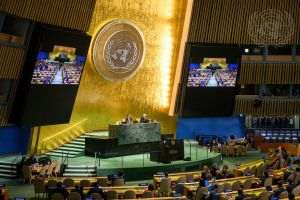Street protests in front of government buildings, heated debates over some legislative projects, disagreements between bankers and MPs, threats, arguments, debtors boycotting banks, foreclosures, empty promises, many lawsuits, suicides - this is the summary at a glance of what has happened in Romania over the last two years, after, on January 15th, 2015, the Swiss National Bank (SNB) lifted the peg of 1.2 for the CHF/Euro exchange rate, imposed in 2011, which caused the CHF/RON exchange rate to go from 3.7415 lei to 4.3287 lei from one day to the next.
The officials of the National Bank of Romania (NBR) were announcing, at the time, that out of the total number of Romanian borrowers, only 5% have CHF denominated loans, and that the new price wouldn't affect the Romanian currency market "too much".
At the same time, both the authorities and banks have promised that they would take steps to help share the burden caused by the rise of the CHF exchange rate.
Just a few banks have launched programs to convert CHF loans at a discount, and the Parliament has passed three laws, after lengthy talks, but one of them (the Law of personal insolvency) was postponed for the second time, one (the Law of conversion at the exchange rate in effect at the time the loan was granted) - was challenged with the Constitutional Court of Romania (CCR) and another (the Law of giving in payment) - is still the subject of controversy.
In this context, CHF borrowers have continued to pay increasingly high installments, due to the higher exchange rate.
Two years later the CHF exchange rate has only fallen from 4.3287 lei (on January 15th 2015) to 4.1858 lei (Friday, January 13th 2017).
On January 22nd, 2015, Nicolae Cinteză, the head of the Oversight Division of the NBR, was announcing that Banca Transilvania would apply a conversion program with a discount to CHF loans granted by Volksbank, after its acquisition of the latter.
Around that same time, Victor Ponta, prime-minister in office at the time, said that the issue of CHF loans could not be solved through their forced conversion to another currency.
The Law of insolvency of individuals was also discussed, but Robert Cazanciuc, Justice Minister in office at the time, was saying that that draft law needed a realistic schedule before being enacted, because its immediate application would cause a deadlock of the courts.
On January 23rd, 2015, the Swiss franc was seeing a new all-time high in Romania, 4.5817 lei.
At the end of January 2015, hundreds of people started protesting, requesting the conversion in lei of the loan agreements taken out in foreign currencies and announcing that they intended to take the banks to court, on criminal charges.
That same month, Dan Suciu, spokesperson of the NBR, was saying that six banks were willing to negotiate options to reduce the installments on CHF loans.
On January 30th, the same year, NBR governor Mugur Isărescu announced that CHF loans do not represent a systemic risk for the economy, as they only accounted for 1.4% of the GDP, five times less than in Poland, and seven times less than in Hungary. At the time, he said that he supported burden sharing, but in a calculated manner.
Starting with February 2015, debtors began boycotting the banks they had borrowed from, by paying their installments using coins, in order to obstruct their operation.
Three months later, the law of personal insolvency was passed by the Parliament.
Around that same time, courts began ruling in favor of debtors in a number of lawsuits which they brought against the banks, and the Ministry of Finance was reviewing the opportunity of a law meant to support CHF borrowers. Meanwhile, 14,000 of Volksbank's customers had accepted the bank's conversion offer.
In August 2015, following an article published by BURSA, the NBR requested the modification of the conversion agreements of Bancpost. Volksbank voluntarily refunded the customers' fees, and OTP Bank and Bancpost were announcing the intention to launch conversion programs as well. Deputies have also decided to resume talks concerning the conversion of foreign currency denominated loans.
In December 2015, the application of the law of insolvency of individuals has been postponed by a year, on claims that the necessary logistics and funds weren't available.
In the beginning of February 2016, banks' customers sent a letter to the Parliament, after the postponement of the debate on the legislation draft concerning the giving in payment, which stipulated that people who owed money to banks would be able to cancel their whole debt by assigning to the bank the property used as collateral for the loan. That initiative, which has been begun since 2015, has created many talks and controversies in the market.
The law of giving in payment was only passed in the Chamber of Deputies on April 13th, 2016, with a majority of 207 votes in favor, one vote against and one abstention.
Less than a month later, Daniel Cătălin Zamfir, PNL deputy at the time, the one who passed the Law of Giving in Payment, asked for the conversion of CHF loans to lei at the historic exchange rate, through an amendment to the legislative draft submitted since back in 2014 by Ana Birchall, PSD deputy at the time.
On October 18th 2016, the Law of conversion of CHF denominated loans at the time of the passing was passed unanimously by the Chamber of Deputies. Six days later it was challenged with the Constitutional Court by the Cioloş government.
The same government also postponed for the second time, the passing of the law of insolvency of individual insolvency, at the end of December.
Now, CHF borrowers are waiting for the decision of the CCR tied to the law of conversion, which is set to be announced on Wednesday, January 18th, 2017.
Over 100 CHF borrowers have protested peacefully yesterday afternoon, in front of the building of the NBR, against the situation created by the rise of the CHF exchange rate. Protesters bore a cross with the slogan "In memory of those who have killed themselves because of banks" and have lit candles before the Central Bank. The protest was attended by the initiators of the Law of giving in payment - lawyer Gheorghe Piperea and PNL senator Daniel Cătălin Zamfir.





















































